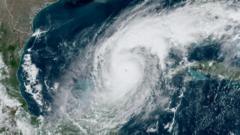Momodou Taal opts for voluntary departure from the US after court ruling denies his appeal.
University Protester Chooses to Depart Amid Deportation Threats

University Protester Chooses to Depart Amid Deportation Threats
Grad student faces US visa revocation due to activism during Israel-Gaza conflict.
In a significant turn of events, a student from Cornell University, Momodou Taal, has decided to leave the United States voluntarily following the revocation of his student visa. Taal, a dual citizen of the UK and The Gambia, had been involved in a series of protests against Israel during heightened tensions from the recent war in Gaza. His departure comes after a judge dismissed his request to postpone his deportation, compelling him to take matters into his own hands.
Taking to social media platform X, Taal expressed his decision to leave "free and with my head held high," indicating a disillusionment with the judicial process and concerns regarding personal safety. His situation highlights the Trump administration’s intensified scrutiny of international students engaged in political activism, particularly those opposing Israeli actions.
Taal, who faced disciplinary action from Cornell on multiple occasions due to his protest activities, called attention to the 300 international students who reportedly had their visas revoked for similar reasons, as cited by Secretary of State Marco Rubio. The administration asserts that the Immigration and Nationality Act permits deportation of non-citizens deemed "adversarial to the foreign policy and national security interests" of the United States.
This crackdown has drawn criticism from many advocacy groups who argue that such actions undermine the principle of free speech on university campuses. Another student, Ranjani Srinivasan, who also elected to leave amid fears of deportation, emphasized that her engagement in protests does not equate to support for terrorism but rather reflects her status as a concerned student.
As the landscape for international students in the US grows increasingly precarious amid this political climate, the experiences of Taal and others prompt broader questions about academic freedom and the right to protest.
Taking to social media platform X, Taal expressed his decision to leave "free and with my head held high," indicating a disillusionment with the judicial process and concerns regarding personal safety. His situation highlights the Trump administration’s intensified scrutiny of international students engaged in political activism, particularly those opposing Israeli actions.
Taal, who faced disciplinary action from Cornell on multiple occasions due to his protest activities, called attention to the 300 international students who reportedly had their visas revoked for similar reasons, as cited by Secretary of State Marco Rubio. The administration asserts that the Immigration and Nationality Act permits deportation of non-citizens deemed "adversarial to the foreign policy and national security interests" of the United States.
This crackdown has drawn criticism from many advocacy groups who argue that such actions undermine the principle of free speech on university campuses. Another student, Ranjani Srinivasan, who also elected to leave amid fears of deportation, emphasized that her engagement in protests does not equate to support for terrorism but rather reflects her status as a concerned student.
As the landscape for international students in the US grows increasingly precarious amid this political climate, the experiences of Taal and others prompt broader questions about academic freedom and the right to protest.





















